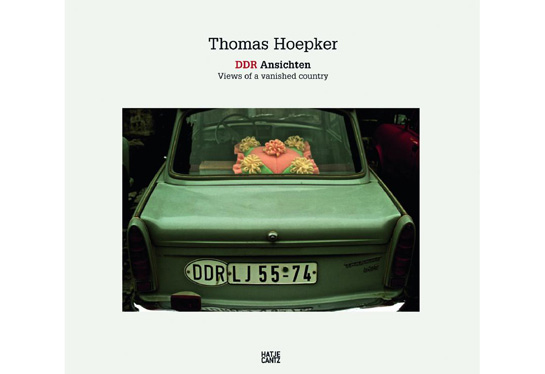Review: DDR Views by Thomas Hoepker

When I was seventeen years old, during my penultimate year of high school, I had to decide about which of the two trips organized by the school I wanted to pick. The tradition had been to offer either London or Paris. Much to my chagrin, when it was my turn - finally a chance to go abroad! - that tradition had been discontinued. Instead, I had the option to either go to Nuremberg or to Potsdam/Dresden. Nuremberg, I reckoned, would basically amount to a week of heavy drinking (the teacher in charge had a certain reputation). It’s not that I minded having a good time. But Potsdam/Dresden - that was basically abroad. Really abroad. OK, people there spoke the same language (give or take a few incredibly weird dialects), but it was beyond what people called the Iron Curtain. As a child, I had seen it with my own eyes: It didn’t look much like a curtain, but there certainly was a lot of iron - and explosives - involved. Potsdam/Dresden it was. (more)
I don’t want to pretend I knew an awful lot about East Germany - the German Democratic Republic as it called itself. In West Germany, it was either known as “DDR” (the German abbreviation), the “Zone” (that was mostly by either right-wing and/or elderly people), or “drüben” (loosely “the other side”; ditto.). But it really was a different country for me. Born in 1968, I grew up and got educated in West Germany. German history was treated very seriously in high school, and I was very aware of why there were two German countries, the one I was living in, and that other one. I suppose I had a healthy mistrust of what the media was telling me about East Germany (or maybe I was just a rebellious teenager), and I figured if I saw the place with my own eyes that would be interesting.
Needless to say, there is no way you can come to any kind of even remotely educated opinion in just one week (especially not if you’re just seventeen years old). But those few days in East Germany were something I’d never forget. Everything was closely monitored, of course. The trip was an official trip, so we had a “chaperone,” someone who’d take us places: A young woman who, and that I’ll certainly never forget, burst out in tears when we said good-bye to her the day we left. I’ll also never forget the official get-together in a “discotheque” (feel free to interpret this term very loosely here) with a bunch of young people from East Germany - carefully selected, we assumed. As it turned out, they had in fact been carefully selected. The get-together quickly adopted the atmosphere of a funeral (despite the fact that alcohol was being served), and there was very little interaction between “us” and “them.” It was pretty depressing.
An avid fan of the right-wing media, my other had warned me that “they” had especially trained people “over there,” who’d pounce on people (aka helpless me) and try to indoctrinate them. And those trained people were very good at it she said. Turns out my mother was right! Well, about half right. They did have those people, as I learned during our get-together. I was sitting somewhere, being incredibly bored and slightly intoxicated, when some guy came up to me and asked me something like “How do you like it here? We certainly don’t have many homeless people in the streets here, eh?” (I’m not making this up) What my mother had got wrong was the fact that while my new “friend” certainly had learned his talking points (I was woefully unprepared), but he hadn’t really learned to argue with any kind of flexibility (given there was only one, the official, position to be had in East Germany). So he ended up having a pretty hard time (it didn’t help his case much that I had actually never seen any homeless people in my sleepy home town, either), while I was trying to indoctrinate him.
Visually, I remember East Germany as being incredibly grey and drab. 70% of my home town had been destroyed by bombs during World War II, but I had never seen a bombed out building - or a building marked by gun fire - until I went to East Germany. To see bombed-out ruins right in the middle of Dresden, a major city - that was just shocking for me. Almost all of that is gone now, of course.
Thomas Hoepker’s DDR Views brings back that vanished country now. While I had just visited for five days, as a teenager, Hoepker spent a much longer time in East Germany, as an official correspondent of various West German (print) media. When the two German countries agreed to have official relations with each other (in the early 1970s), Hoepker and his (then) wife Eva Windmöller moved to East Berlin for three years. During those years, Hoepker became friends with many East German photographers and with people called “the others” in the book: Writers, artists, dissidents. One of them, singer/songwriter Wolf Biermann, famously expelled from East Germany in the mid-1970s, wrote the foreword to the book, which in itself is pretty much worth the price of the book:
“These photographs are proof: Hoepker defends imperfect, even the worst democracy against the best dictatorship. He prefers uncomfortable freedom to comfortable oppression. […] Let it be known to coming generations: at that time it did not take the photographer long to find attractive atrocities and scandalous examples.”
So here it is, the German Democratic Republic, risen yet again from ruins (as its anthem proclaimed), seen through the eyes of Thomas Hoepker, with a lot of very smart and engaging writing around it. A beautiful achievement.
DDR Views, photographs by Thomas Hoepker, essays by Wolf Biermann, Günter Kunert, Eva Windmöller, 256 pages, Hatje Cantz, 2011